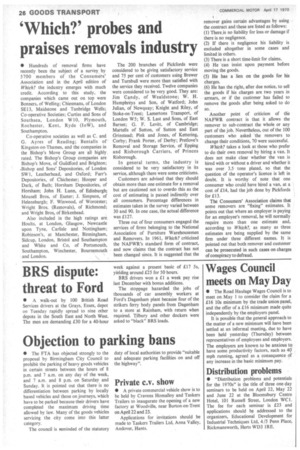'Which?' probes and praises removals industry
Page 28

If you've noticed an error in this article please click here to report it so we can fix it.
• Hundreds of removal firms have recently been the subject of a survey by 5700 members of the Consumers' Association and in the April edition of Which? the industry emerges with much credit. According to this study, the companies which came out on top were Bonners, of Welling; Chiesmans, of London SE13, Maidstone and Tunbridge Wells; Co-operative Societies; Curtiss and Sons of Southsea, London W10, Plymouth, Rochester, Kent, Ryde (IoW), and Southampton.
Co-operative societies as well as C. and G. Ayres of Reading; Bentalls of Kingston-on-Thames, and the companies in the Bishop's Move Group are all highly rated. The Bishop's Group companies are Bishop's Move, of Guildford and Brighton; .Bishop and Sons' Depositories, of London SW1, Leatherhead, and Oxford; Farr's Depositories, of Chichester; Hooper and Dark, of Bath; Horsham Depositories, of Horsham; John H. Lunn, of Edinburgh; Mouse!! Bros, of Exeter; J. Simpson, of Helensburgh; F. Winwood, of Worcester; Wright Bros. (Removals), of Richmond; and Wright Bros, of Birkenhead.
Also included in the high ratings are Hoults, at London, Glasgow, Newcastle upon Tyne, Carlisle and Nottingham; Robinson's, at Manchester, Birmingham, Sidcup, London, Bristol and Southampton and White and Co, of Portsmouth, Southampton, Winchester, Bournemouth and London. The 200 branches of Pickfords were considered to be giving satisfactory service and 75 per cent of customers using Brewer and Turnbull were more than satisfied with the service they received. Twelve companies were considered to be very good. They are: Jim Candy, of Wealdstone; W. H. Humphreys and Son, of Watford; John Julian, of Newquay; Knight and Riley, of Stoke-on-Trent; Lamertons Transport, of London W5; W. S. Last and Sons, of East Barnet; G. F. Levitt, of Cambridge; Martens of Sutton. of Sutton and East Grinstead; Pink and Jones, of Kettering, Corby; Frank Porter, of Derby; Pretlove's Removal and Storage Service, of Epping and Risborough Carriers, of Princes Risborough.
In general terms, the industry is considered to be very satisfactory in its service, although there were some criticisms.
Customers are advised that they should obtain more than one estimate for a removal but are cautioned not to overdo this as the cost of estimating is passed indirectly over all consumers. Percentage differences in estimates taken in the survey varied between 30 and 90. In one case, the actual difference was £127.
Three out of four consumers engaged the services of firms belonging to the National Association of Furniture Warehousemen and Removers. In 1961, Which? criticized the NAFWR's standard form of contract, and now claims that the contract has not been changed since. It is suggested that the
remover gains certain advantages by using the contract and these are listed as follows: (1) Thereis no liability for loss or damage if there is no negligence.
(2) If there is negligence his liability is excluded altogether in some cases and limited in others.
(3) There is a short time-limit for claims.
(4) He can insist upon payment before moving the goods.
(5) He has a lien on the goods for his charges.
(6) He has the right, after due notice, to sell the goods if his charges are two years in arrears, or if the customer has failed to remove the goods after being asked to do so. , Another point of criticism of the NAFWR contract is that it allows the remover to sub-contract the whole or any part of the job. Nevertheless, out of the 100 customers who asked the removers to change their conditions, 70 were successful.
Which? takes a look at those who prefer to do their own removal by hiring a van. It does not make clear whether the van is hired with or without a driver and whether it was over 3.5 tons plated, so that the question of the operator's licence is left in doubt. It is worthy of note that one consumer who could have hired a van, at a cost of £14, had the job done by Pickfords for £13.
The Consumers' Association claims that some removers are "fixing" estimates. It points out that where an employer is paying for an employee's removal, he will normally require more than one estimate and, according to Which?, as many as three estimates are being supplied by the same firm under three different names. It is pointed out that both remover and customer can be prosecuted in such cases on charges of conspiracy to defraud.












































































































